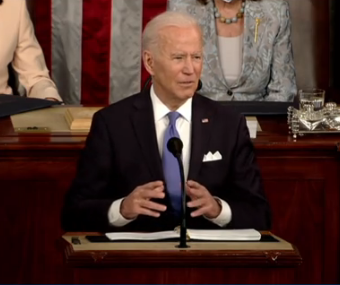
- Details
- By Levi Rickert
WASHINGTON — President Joe Biden’s first fiscal year budget was submitted to Congress on Friday. The Biden-Harris administration's budget totals $6 trillion.
The President’s budget contains $30.6 billion for Native-serving federal programs and includes several longstanding policy proposals called for by Tribes and Tribal organizations.
Want more Native News? Get the free daily newsletter today.
Funding for Indian Country is spread over various federal agencies. Overall, the President’s budget contains $30.6 billion for Native-serving federal programs and includes several longstanding policy proposals called for by tribes and tribal organizations.
“President Biden’s FY22 budget is proof positive of his commitment to upholding the United States’ trust responsibility for tribes and Native communities,” Sen. Brian Schatz (D-Hawai‘i), chairman of the Senate Committee on Indian Affairs Bryan Schatz said. “This historic funding for Native communities will improve health outcomes for Native Americans, support educational opportunities for Native students, drive tribal economic development, provide much-needed investment in community infrastructure, and empower the development of Native-led climate solutions.”
Two areas that stand out in the President’s budget are funding proposed for Indian Affairs at the U.S. Dept. of the Interior and Indian Health Service, which is part of the U.S. Dept. of Health and Human Services. The Department of the Interior’s 2022 budget proposal totals $17.6 billion — an increase of $2.5 billion, or 17 percent, from the 2021 enacted level.
Indian Affairs Programs – U.S. Dept. of the Interior
One key component of the President’s Fiscal Year 2022 Budget request for Indian Country is the president’s fulfillment of he made to strengthen tribal nations. To underscore the administration’s focus on Indian Country is an increase of $727.8 million from the 2021 enacted level, across all Indian Affairs programs within the U.S. Dept. of the Interior. This increase brings the total proposed $4.2 billion for Indian Affairs programs.
A portion of the funding will support a new Indian Land Consolidation Program, which will address the problem of fractionated lands and enhance the ability of tribal governments to plan for and adapt to climate change and to build stronger tribal communities. The budget will also provide increases to strengthen tribal natural resource programs, Tribal public safety, and efforts to provide leadership and direction for cross-departmental and interagency work involving missing and murdered American Indian and Alaska Native peoples.
“The Interior Department plays an important role in the President’s plan to reinvest in the American people. From bolstering climate resiliency and increasing renewable energy, to supporting Tribal nations and advancing environmental justice, President Biden’s budget will make much-needed investments in communities and projects that will advance our vision for a robust and equitable clean energy future,” Interior Secretary Deb Haaland said.
Indian Health Service (IHS) – U.S. Dept. of Health and Human Services
The President’s Fiscal Year 2022 Budget proposes the largest single-year funding increase for IHS in decades. The budget requests a total of $8.5 billion in discretionary funding for the IHS. This is an increase of $2.2 billion dollars, or 36 percent above the fiscal year 2021 enacted funding level.
Within the IHS budget released on Friday include significant investments for IHS, tribal, and urban Indian health programs that will expand access to health care services, modernize aging facilities and information technology infrastructure, and address urgent health issues, including HIV and hepatitis C, maternal mortality, and opioid use.
“Today’s announcement acknowledges the need to identify long-term solutions to address IHS funding challenges, which have a direct impact on the health of American Indian and Alaska Native people.” IHS Acting Director Elizabeth Fowler said.
For more information, please see the Fiscal Year 2022 IHS Congressional Justification
Also, included in the request includes $100 million for urban Indian health across the United States.
"For decades, urban Indian health has been severely underfunded even though more than 70 percent of American Indians and Alaska Natives reside in urban areas. We are pleased to see the President's inclusion of $100 million for urban Indian health in FY22, which represents an important step towards achieving full funding. As the federal trust responsibility for health care follows all Natives off of reservations into the cities where many of us reside today, it is encouraging to see the Administration and Congress finally prioritizing the Indian health system with a significant increase in resources for next year," National Council of Urban Indian Health Executive Director Francys Crevier said.
Congress will consider President Biden’s request as it begins to draft appropriations bills for Fiscal Year 2022.
More Stories Like This
Native News Weekly (August 25, 2024): D.C. BriefsNavajo Nation Mourns the Passing of Former Vice President Rex Lee Jim
Deb Haaland Earns Endorsement From Communications Workers of America Local 7076
University Soccer Standout Leads by Example
Two Native Americans Named to Democratic Congressional Campaign Committee's“Red to Blue” Program
Help us defend tribal sovereignty.
At Native News Online, our mission is rooted in telling the stories that strengthen sovereignty and uplift Indigenous voices — not just at year’s end, but every single day.
Because of your generosity last year, we were able to keep our reporters on the ground in tribal communities, at national gatherings and in the halls of Congress — covering the issues that matter most to Indian Country: sovereignty, culture, education, health and economic opportunity.
That support sustained us through a tough year in 2025. Now, as we look to the year ahead, we need your help right now to ensure warrior journalism remains strong — reporting that defends tribal sovereignty, amplifies Native truth, and holds power accountable.
 The stakes couldn't be higher. Your support keeps Native voices heard, Native stories told and Native sovereignty defended.
The stakes couldn't be higher. Your support keeps Native voices heard, Native stories told and Native sovereignty defended.
Stand with Warrior Journalism today.
Levi Rickert (Potawatomi), Editor & Publisher

